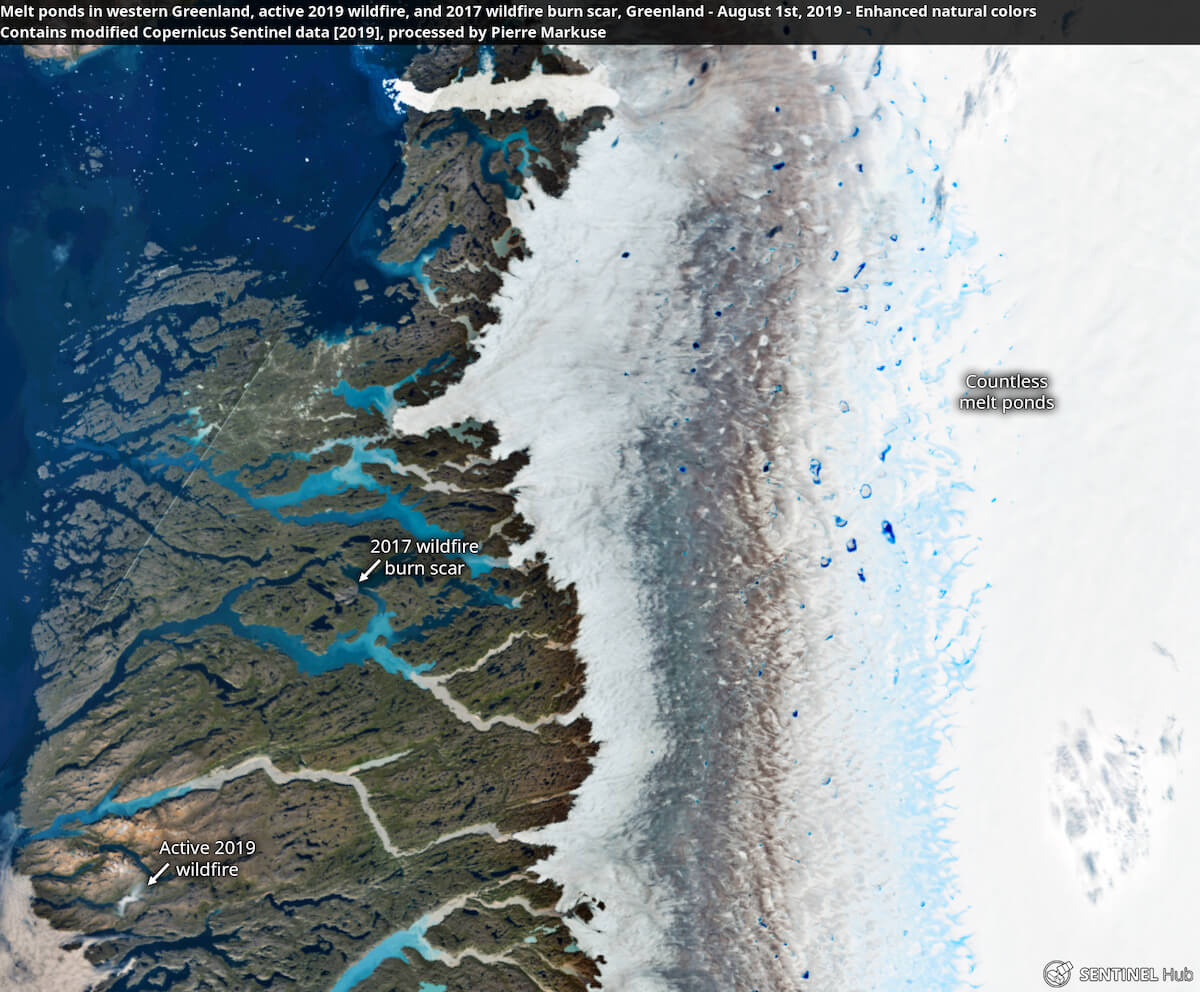By Max Wilbert / Image by Pierre Markuse, CC BY 2.0, shows 2019 melt ponds across the surface of the Greenland Ice Sheet)
Official temperature records for July 2019 show that it was the hottest July and hottest single month ever recorded globally, at 1.2°C hotter than the pre-industrial average.
This comes after a June that was the hottest June every recorded, and a January, February, March, April, and May that were all in the top four hottest months every recorded.
Greenland: 12.5 Billion Tons of Ice Lost in 24 Hours
On August 1st, more than 12.5 billion tons of ice melted in Greenland as temperatures reached 30 degrees above average. Video here. This level of melting is consistent with what some climate models were predicting—for the year 2070.
The last four years, 2015, 2016, 2017, and 2018 are the four hottest years on record globally, but 2019 may break the new record for the hottest year ever recorded.
As we recently noted, climate chaos is accelerating. Industrial civilization and the global capitalist economy are wreaking havok on the planet. And as Christian Parenti has written, “Climate change arrives in a world primed for crisis. The current and impending dislocations of climate change intersect with the already-existing crises of poverty and violence. I call this collision of political, economic, and environmental disasters “the catastrophic convergence.”
The Unfolding Climate Chaos
The scale of unfolding catastrophe is almost unimaginable. One report concluded that “The number of climate refugees could increase dramatically in future. Researchers of the Max Planck Institute for Chemistry and the Cyprus Institute in Nicosia have calculated that the Middle East and North Africa could become so hot that human habitability is compromised.”
William R. Freudenburg, and professor of Environmental Sociology, released a report in 2010 finding that new scientific findings almost always underestimate the severity and speed of global warming.
“Reporters need to learn that, if they wish to discuss ‘both sides’ of the climate issue, the scientifically legitimate ‘other side’ is that, if anything, global climate disruption is likely to be significantly worse than has been suggested in scientific consensus estimates to date,” he said.
Solutions to the Climate Crisis
Deep Green Resistance does not believe that climate marches will save the planet. This has been happening for decades, and no progress has been made. Emissions are higher than ever. The U.S. is now the world’s leading oil producer and mainstream climate movements have had zero success in stopping this.
Instead, we advocate for organized militant resistance, including coordinated sabotage against the industrial system. We don’t believe the ruling class will stop the murder of the planet unless they are literally forced to stop.
Here is an excerpt from the Deep Green Resistance book:
Historians now believe that Allied reluctance to attack early in the war may have cost many millions of civilian lives. By failing to stop Germany early, they made a prolonged and bloody conflict inevitable. General Alfred Jodl, the German Chief of the Operations Staff of the Armed Forces High Command, said as much during his war crimes trial at Nuremburg….
[In this future scenario,] Resisters aimed to reduce consumption and industrial activity, so it didn’t matter to them that some facilities had backup generators or that states engaged in conservation and rationing. They celebrated nationwide oil conservation and factories running on reduced power. They remembered that in the whole of its history, the mainstream environmental movement never even stopped the growth of fossil fuel consumption. To actually reduce it was unprecedented… Targeting energy networks was a high priority to resisters. Many electrical grids were already operating near capacity, and were expensive to expand. They became more important as highly portable forms of energy like fossil fuels were partially replaced by less portable forms of energy. Resisters recognized that energy networks often depend on a few major continent-spanning trunks, which were very vulnerable to disruption.”
To learn more about effective strategies for defending the climate, read the Deep Green Resistance book or browse our website.


Thank you for not being a part of ‘fake news’.